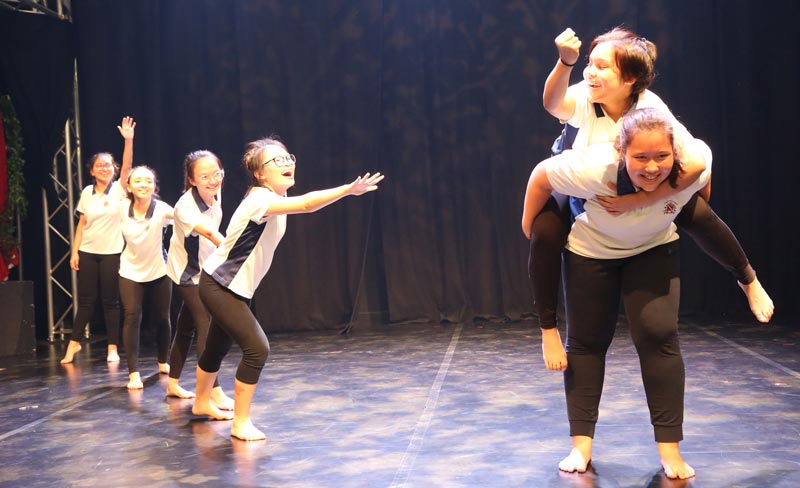What can you do with a chair, apart from sitting on it?
This sounds like a trivia quiz question, but for Secondary 3 students of CHIJ Katong Convent, it is time to put their creative juices to the test. They have to come up with a scene from a play, based on a nursery rhyme.
The activity is part of the school’s Drama Elective Programme, where students get a chance to learn about the inner workings of a theatrical production.
At the school, all Secondary 1 and 2 students are first exposed to drama in a foundation programme, and some of them would eventually go on to pursue it as a GCE O-Level Applied Subject in their upper secondary years.
At the foundation level, students learn different play forms and basic acting skills and characterisation, while upper secondary students delve deeper into understanding, structuring and creating drama productions.
Drama lessons would often involve students collaborating to come up with different types of performances based on text or a given topic. The students also learn to analyse and evaluate their work, and present their thoughts and findings to their classmates.
Such activities encourages the students to think critically and make meaning of their observations. They would also get a deeper understanding of Singapore history as they study local plays such as Kuo Pao Kun’s “Silly Little Girl” and “Funny Old Tree”.
The aim of the programme is also to help students explore their interests, so that they can make informed decisions on their post-secondary education options.
Valuable skills for life
For students who are not interested or have the aptitude for drama, learning the subject is not a waste of time, as they will still gain valuable lessons.
“Drama is recognised as a subject that can develop the competencies necessary to thrive in an increasingly complex and dynamic world,” explains Ms Yin Mei Lenden, CHIJ Katong Convent’s Drama Coordinator.
“Drama too equips students with the skills to problem-solve and make meaning, and facilitate communication and collaboration. These skills are integral to flourishing in today’s VUCA (volatile, uncertain, complex, ambiguous) landscape.”
Students have attested to gaining important skills and qualities through drama.
“Drama has boosted my confidence and allowed me to accept opportunities I would never have considered a few years back, such as talking in front of the school, or putting on a 15-minute piece for school visitors,” shares Secondary 4 student Isabel Wai Yin Kuffel. “I’m no longer afraid to make mistakes. There’s nothing wrong in trying again, learning and carrying on.”
For Secondary 4 student Sara Eva Van Riet, drama has expanded her view of current affairs and issues beyond school.
“In drama, we go more in depth with social issues which we may not pay much attention to, ” she says. “I get to explore new issues which I have not been aware of and I get to ‘tell’ others through performances, and help to shed new light.”






.jpg)